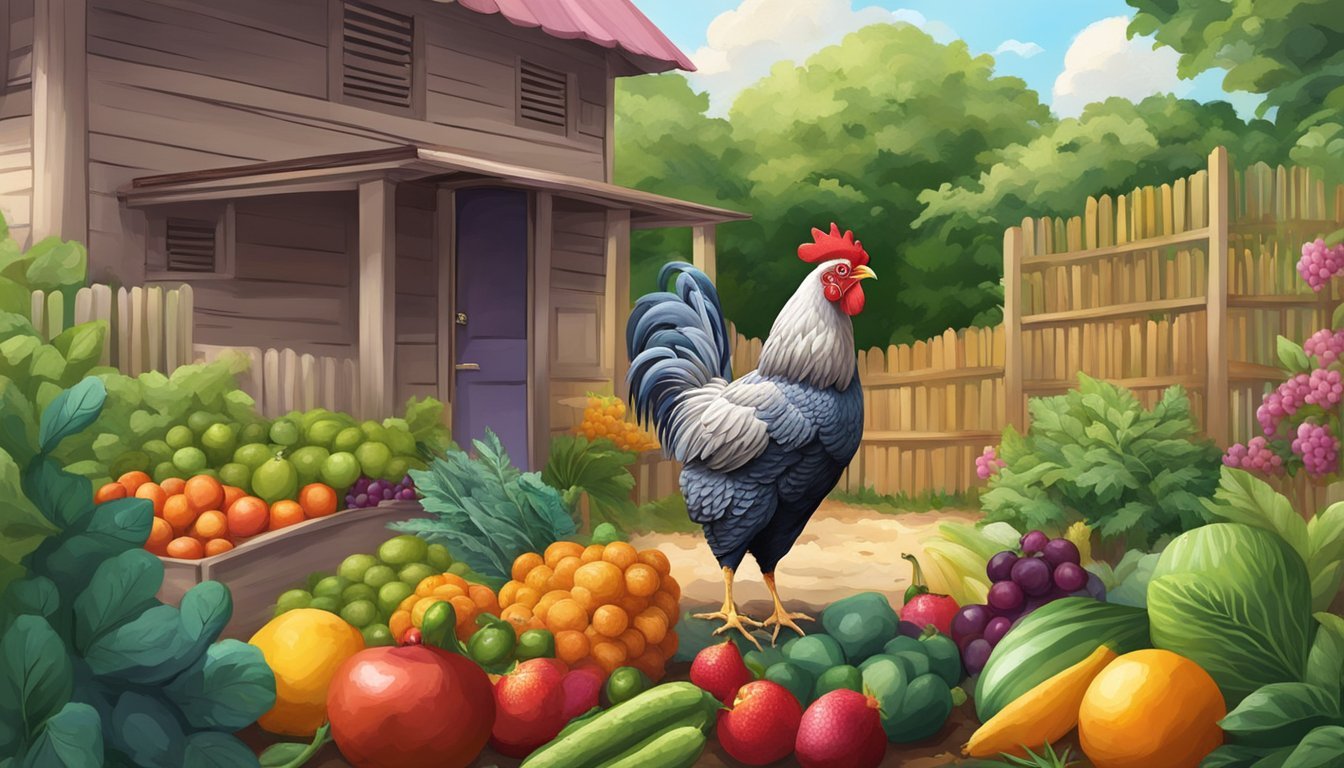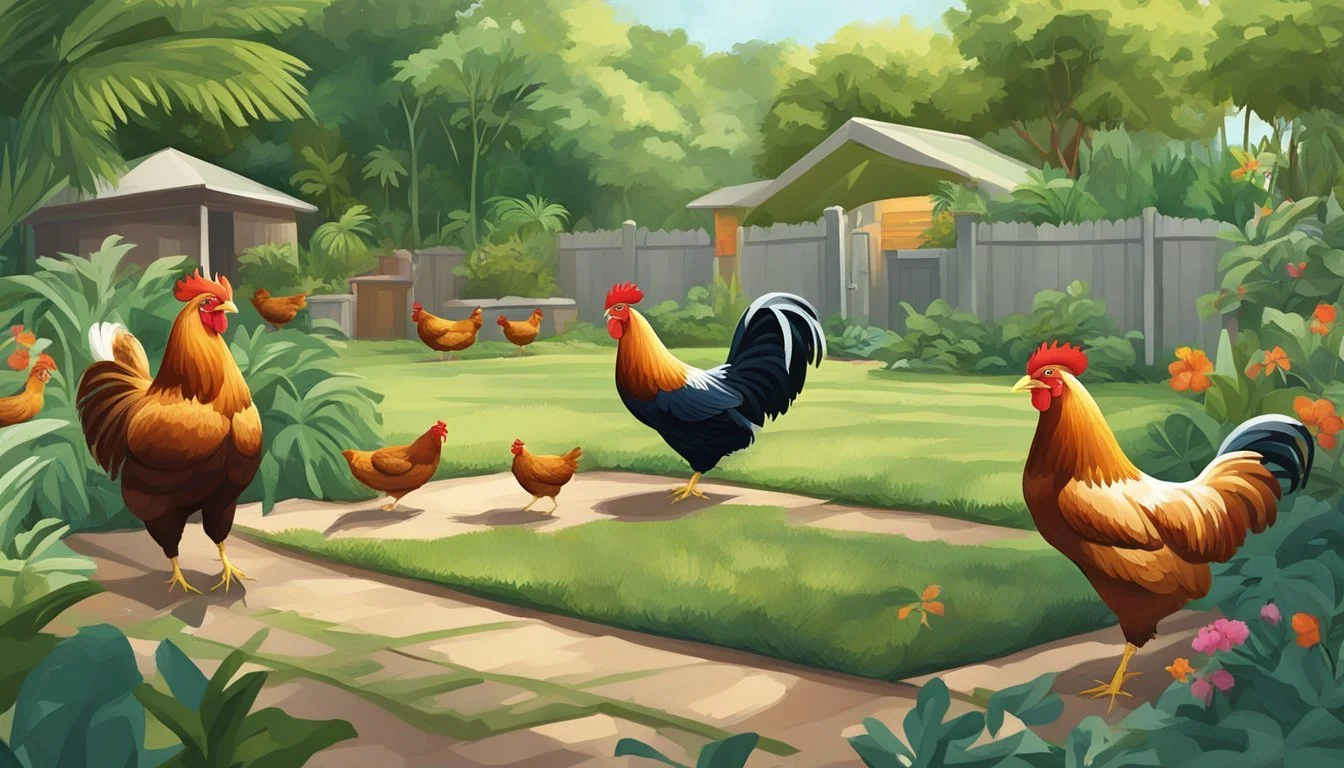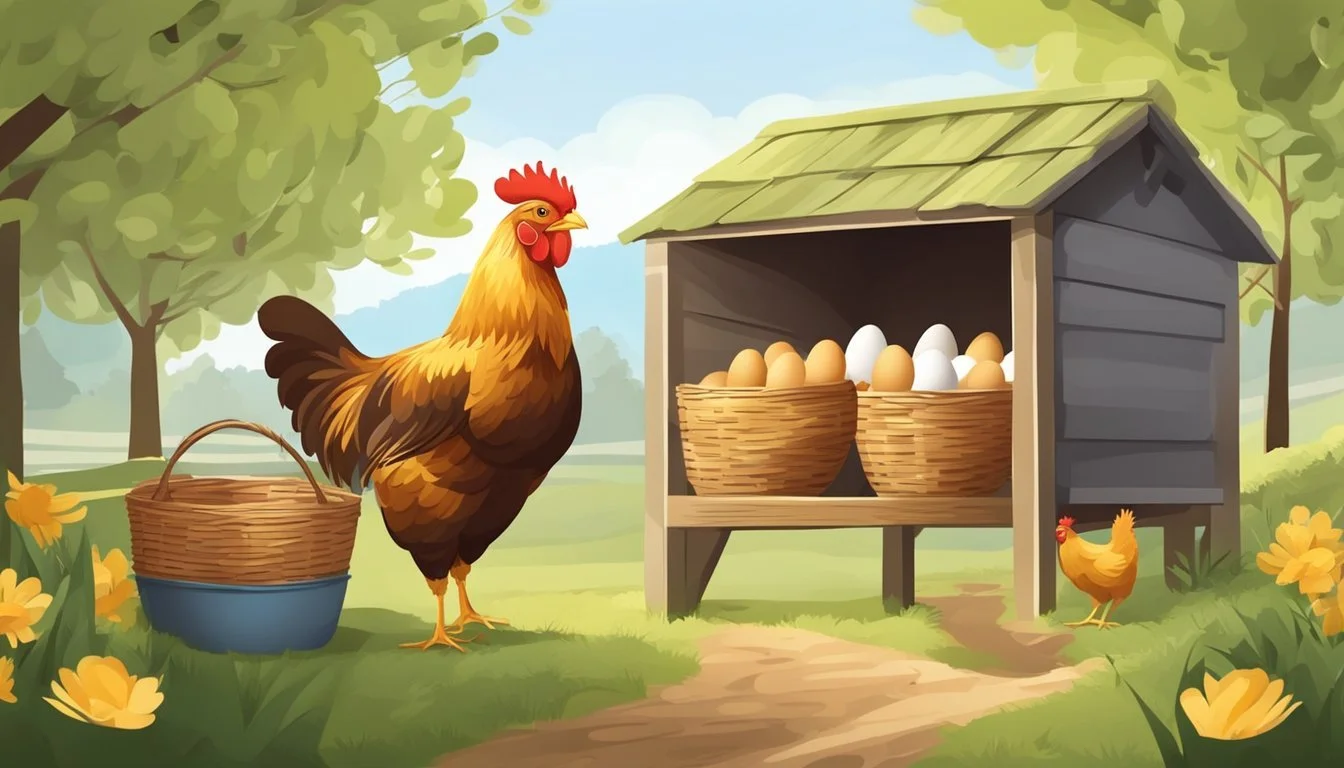Raising Backyard Chickens in Ponce, PR
Key Guidelines for Beginners
Raising backyard chickens has become an increasingly popular practice in urban areas, offering residents a slice of self-sufficiency with the added bonus of fresh eggs. In the city of Ponce, Puerto Rico, the trend finds a welcoming environment with the city's warm climate and bustling community. Beginners in the area can take advantage of almost perfect conditions for poultry keeping, although some considerations are necessary, such as preparing for the occasional tropical storm.
For novices in Ponce looking to start their own flock, understanding the basics of chicken care is crucial. Essential elements include providing a clean, spacious coop for shelter, access to clean water and a balanced diet, and safeguards against potential predators. With the city's streets historically dotted with a variety of chickens, from bantams to mixed breeds, it's clear that Ponce's environment is conducive to raising these birds.
However, those new to backyard chicken keeping should be prepared for the responsibilities that come with raising poultry in an urban setting. They must consider their neighbors, local regulations, and the commitment required to maintain a healthy and productive flock. For city dwellers in Ponce, this means ensuring their chickens have enough space to roam and interact, both indoors and outdoors, while also keeping their impact on the surrounding area in mind.
Choosing the Right Breed
Choosing the right breed of chicken for a backyard in Ponce, Puerto Rico, involves understanding the various breeds, the local climate, and the purpose of raising these birds, whether it be for egg production, meat, or as friendly pets.
Understanding Chicken Breeds
Chicken breeds are diverse, with characteristics ranging from egg production efficiency to temperament. Breeds like the Rhode Island Red and Leghorn are known for their prolific egg-laying capabilities, while the Sussex and Plymouth Rock are appreciated for their friendly temperament and dual-purpose nature.
Selecting the Best Breeds for Ponce Climate
The climate in Ponce, Puerto Rico, is typically warm, which suits breeds like the Andalusians. However, it's important to avoid breeds prone to frostbite, such as those not built for heat. Breeds that thrive well in warm climates include:
Leghorn: Known for heat tolerance and high egg production.
Sussex: Adaptable to various conditions and a dual-purpose breed.
Special Considerations for Heritage and Dual-Purpose Breeds
Heritage breeds, such as the Plymouth Rock, are often chosen for their longevity and sustainable breeding characteristics. Dual-purpose breeds offer flexibility, providing both egg production and meat. When selecting these breeds, one must consider:
Temperament: Breeds like the Golden Comet are friendly, making them suitable for household pets.
Purpose: If the goal is to have a source of eggs and meat, dual-purpose breeds like the Sussex and Plymouth Rock are ideal choices.
Setting Up Your Chicken Coop
When establishing a chicken coop in Ponce, PR, one must consider the coop's size and structure, protection against local predators, and the selection of appropriate bedding for ease of maintenance.
Coop Essentials and Size Requirements
Adequate space is crucial for chickens to thrive. Each chicken requires at least 2-3 square feet of space inside the coop and 8-10 square feet in an outdoor chicken run. The coop should be equipped with nesting boxes (one per 4-5 hens) and perches to allow for natural roosting behaviors.
Minimum space (inside coop): 2-3 sq ft per chicken
Outdoor run space: 8-10 sq ft per chicken
Key Features:
Nesting Boxes: 1 box per 4-5 hens
Perches: Length to accommodate all chickens
Protection Against Predators
Ponce, PR, is home to various predators, including birds of prey and stray animals. A predator-proof chicken coop is essential by installing hardware cloth instead of chicken wire around the coop and beneath the soil of the outdoor run to prevent digging intruders. Lockable doors should be sturdy and fitted with robust latches.
Predator-Proofing Measures:
Use hardware cloth over windows and run areas
Secure the perimeter with buried hardware cloth
Coop Bedding and Maintenance
Pine shavings make excellent bedding for chicken coops due to their absorbency and odor control. They should be spread generously over the floor, and in the nesting boxes. Regular cleaning and replacement of bedding ensure a healthy environment.
Bedding Materials:
Recommended: Pine shavings
Clean and replace bedding frequently
Perform spot checks weekly
Nutrition and Feeding
Nutrition plays a pivotal role in the health and productivity of backyard chickens in Ponce, Puerto Rico. Whether they are pets, egg layers, or meat producers, chickens require a balanced diet with essential nutrients.
Feeding Basics and Starter Feed
When it comes to feeding backyard chickens, the first weeks of life are critical. Starter feed should have a higher protein content, typically 23-25%, to support rapid growth and development. This high-protein feed is crucial until the chicks are 6 weeks old, after which growers feed with a protein percentage of 14-18% is sufficient until they are ready to lay eggs.
Waterers and Feeders
Chickens must have constant access to clean water and food. Waterers and feeders designed to minimize waste and prevent drowning are indispensable. One must ensure the feeders are easily accessible but also designed to avoid contamination by dirt and droppings. Chickens prefer a continuous supply of feed, allowing them to eat at will which encourages natural foraging behavior.
Nutritional Supplements and Treats
Additional nutritional supplements can enhance a chicken's diet and overall health. Oyster shells are commonly provided as a source of calcium, vital for strong eggshells. Grit is essential for digestion, as chickens do not have teeth to grind their food. Chickens also enjoy treats like mealworms, which can be a high-protein snack. However, treats should be given in moderation and should not make up more than 10% of the chicken's diet.
Health and Wellness
Proper health and wellness practices are essential for backyard chicken keepers in Ponce, PR, to ensure their birds are thriving. It encompasses regular veterinary care, disease prevention and management, and stringent biosecurity measures.
Regular Veterinary Care
Chickens require routine veterinary care to maintain their health. Regular check-ups can prevent or catch early stages of disease, making treatment more effective. Vaccinations, where appropriate, are invaluable in protecting against common poultry ailments.
Preventing and Managing Diseases and Parasites
Diseases and parasites can seriously affect a flock's health. Keepers should be proficient in identifying signs of illness, such as changes in behavior or abnormal droppings. Effective management includes:
Sanitation: Regular cleaning of the coop and equipment.
Quarantine: Isolating new or sick birds to prevent spread of disease.
Parasite Control: Routine checks and treatment for mites, lice, and worms.
Biosecurity and Flock Health
Biosecurity involves measures taken to keep diseases out of flocks, protecting flock health. Key practices include:
Traffic Control: Limiting the movement of people and equipment that can carry pathogens.
Wildlife Management: Preventing contact with wild birds that may carry diseases.
By adhering to these guidelines, chicken owners in Ponce can help ensure their backyard flocks remain healthy and productive.
Rearing and Breeding Chickens
In Ponce, Puerto Rico, the practice of rearing and breeding chickens requires a clear understanding of the incubation process, the care needed for the young chicks, and knowledge of the breeding process to maintain a healthy flock.
Incubating and Hatching Eggs
To successfully incubate eggs, one must maintain a stable environment with the correct temperature and humidity levels. The ideal temperature for incubation is between 99.5°F and 102°F with a humidity ranging from 40-50%, which must be increased to 65-75% just before hatching. Fertilized eggs take about 21 days to hatch, and it is critical during this time to turn them several times a day to prevent the embryo from sticking to the shell.
Caring for Baby Chicks
Once hatched, baby chicks require a warm, safe environment to thrive. The brooder temperature should start at around 95°F and decrease by 5°F weekly until they are acclimatized to the ambient temperature. Baby chicks need access to fresh water and starter feed that is high in protein to support their rapid growth. It is also essential to monitor them closely for signs of distress or illness, which can spread quickly through a young flock.
Understanding the Breeding Process
Breeding chickens involves selecting the right hens and roosters to create a robust and healthy flock. Genetic diversity is key to disease resistance and vigour. Breeders should look for desirable traits like good temperament, physical health, and productivity when choosing which chickens to mate. Breeding also requires knowledge of the chickens' reproductive cycles and behaviors, as well as considerations for managing the genetics of the subsequent generations.
Egg Production and Harvesting
In Ponce, Puerto Rico, raising backyard chickens primarily for egg production requires attention to breed selection and hen comfort to maximize yield. Proper collection and storage practices ensure fresh eggs maintain their quality.
Maximizing Egg Yield
To maximize egg yield, it is essential to select breeds known for consistent laying. Breeds like Anconas produce approximately 220 large white eggs annually. Optimizing laying conditions is also crucial; layers need a comfortable environment that includes well-constructed nesting boxes. Each nesting box should be kept clean and lined with straw or shavings to encourage laying and protect eggs. Consistent daylight hours are necessary for egg production, which may necessitate supplemental lighting if natural daylight is insufficient.
Key points for maximizing yield:
Choose high-producing breeds
Provide comfortable nesting boxes
Maintain consistent light exposure
Collecting and Storing Eggs
Fresh eggs should be collected daily to maintain their quality and prevent damage. After collecting, they must be cleaned gently and stored promptly in a cool environment. Freshly laid eggs have a protective coating called the "bloom" that helps keep them fresh; therefore, washing is only necessary if eggs are soiled.
Guidelines for egg collection and storage:
Collect eggs each day, ideally in the morning
Store at a consistent, cool temperature
Wash only soiled eggs to preserve the bloom
By adhering to these practices, one can ensure a steady supply of fresh eggs from their backyard flock in Ponce.
Integrating Chickens into Permaculture
Incorporating chickens into permaculture designs in Ponce, PR, provides a multifaceted approach to sustainability. These practices utilize the natural behaviors of chickens to enhance soil fertility and manage pests.
Utilizing Chicken Manure for Compost
Chicken manure is a potent source of nitrogen, essential for effective composting. Poultry waste, combined with carbon-rich materials such as dry leaves or straw, can be turned into compost that serves as an excellent fertilizer for gardens. The process typically involves:
Collection: Manure, along with bedding material, is gathered from chicken coops.
Composting: The mixture is composted by monitoring moisture levels and ensuring regular turning to aerate the pile.
Curing: After the initial composting phase, the material is left to cure, breaking down further into finer, nutrient-rich compost.
Properly managed, chicken manure compost is safe for use in gardens, contributing to soil health and plant vigor.
Chickens for Pest Control and Soil Improvement
Chickens can be instrumental in permaculture systems as natural pest controllers. They feed on a variety of insects and pests that could otherwise damage crops. Here’s how they contribute:
Pest Control: Their foraging reduces populations of harmful insects, curbing the need for chemical pesticides.
Soil Improvement: While searching for food, chickens scratch at the soil, aiding in aeration and helping to mix organic material into the topsoil.
The introduction of chickens should be balanced with the needs of the garden, ensuring that their foraging does not harm sensitive plants. A strategic approach to chicken integration within a permaculture garden benefits both the birds and the ecosystem.
Local Regulations and Community
In Ponce, Puerto Rico,
Understanding Ponce's Poultry Regulations
In Ponce, specific regulations govern the keeping of poultry. It is crucial for residents to investigate and adhere to these local laws to avoid potential legal issues and to ensure the welfare of both their chickens and the community. For example, there may be rules regarding the number of chickens allowed per household, coop construction standards, and restrictions on roosters due to noise concerns.
Integrating Chickens into the Neighborhood
Raising chickens in a community setting means being mindful of how poultry can impact neighbors. Fostering good relationships involves:
Securing chickens properly: Residents should ensure that their chickens are contained within their property to prevent them from wandering and potentially causing disturbances or damage.
Noise management: While roosters are often restricted, even hens can be loud. Selecting quieter breeds and employing sound-dampening coop designs can help maintain peace.
Cleanliness: Proper sanitation is non-negotiable to avoid odors and pests which can affect the community. Regular cleaning of the coop and secure storage of feed to deter rodents are best practices.
Education: Informing neighbors about the benefits of backyard chickens, such as pest control and fresh eggs, can help integrate poultry-keeping into community life.
Daily Routines and Long-term Care
Raising backyard chickens in Ponce, PR, requires diligent care that spans from daily tasks to ensuring their well-being over time. The focus lies in creating stability and security for the pets through a consistent schedule and adaptability to environmental changes, coupled with a commitment that extends through the life of the flock.
Setting a Daily Care Schedule
A typical day for backyard chickens includes a series of care activities that maintain their health and welfare. Morning responsibilities involve letting the chickens out of the coop, providing fresh food and water, and collecting eggs. The evening routine includes returning the chickens to their coop and securing it against predators. Regular coop cleaning is essential to avoid diseases and parasites, though the frequency of deep cleaning may vary.
Morning:
Unlock the coop
Refresh water and feed
Collect eggs
Observe chicken behavior for any signs of distress
Evening:
Guide chickens back into the coop
Check the enclosure for security
Remove any leftover food to deter pests
Planning for Seasonal Changes
Chickens require additional consideration during seasonal changes, particularly in tropical locales like Ponce. They rely on their caregivers to adjust their care according to the weather. During hotter months, it’s critical to provide ample shade and cool, clean water to prevent overheating. In periods of heavy rain, drainage in their living area is necessary to prevent standing water from presenting health risks.
Summer: Ensure adequate shade, increased water supply, and airy coops.
Rainy Season: Implement effective drainage, maintain dry bedding and secure the coop from leaks.
Long-term Commitment to Your Flock
One needs to regard raising chickens as a long-term commitment, as a small flock can live for several years. Preparation for their care must include planning for their needs at different stages of life, from the heat requirements of chicks to the reduced activities of older hens and roosters. Backyard chickens are social animals and benefit from a stable group dynamic, so introducing new birds should be done thoughtfully. Regular veterinary check-ups also contribute to the longevity and health of the flock.
Life stages:
Provide a heat source for chicks
Transition diets from starter feeds to layer pellets as they age
Consider special care for older chickens
Flock Dynamics:
Introduce new chickens carefully
Maintain a peaceful and social environment
Health and Wellness:
Regular health checks
Parasite prevention
Vaccinations if applicable
Conclusion
Raising backyard chickens in Ponce, Puerto Rico, offers a unique experience for both novice and seasoned enthusiasts. Poultry keepers appreciate the dual benefits of fresh eggs and companionship. Key factors to successful chicken keeping in this region include:
Housing: A secure and spacious coop is essential. For a small flock of 6 chickens, 18-24 square feet with 2-3 nesting boxes is advisable.
Protection: Chickens should be protected from predators and extreme weather, a common necessity in Ponce.
Nutrition: High-quality feed and clean water are imperative to maintain healthy birds.
Community: Local communities often embrace chicken rearing, sharing resources and expertise.
Regulations: It is important to stay informed about any local ordinances concerning backyard poultry.
Through commitment and care, individuals often find that the chickens become an integral part of their families, and the learning curve is greatly rewarded with an abundance of fresh eggs and the enjoyment of observing these engaging creatures. The key is in responsible management and a genuine investment in the welfare of the backyard flock.












